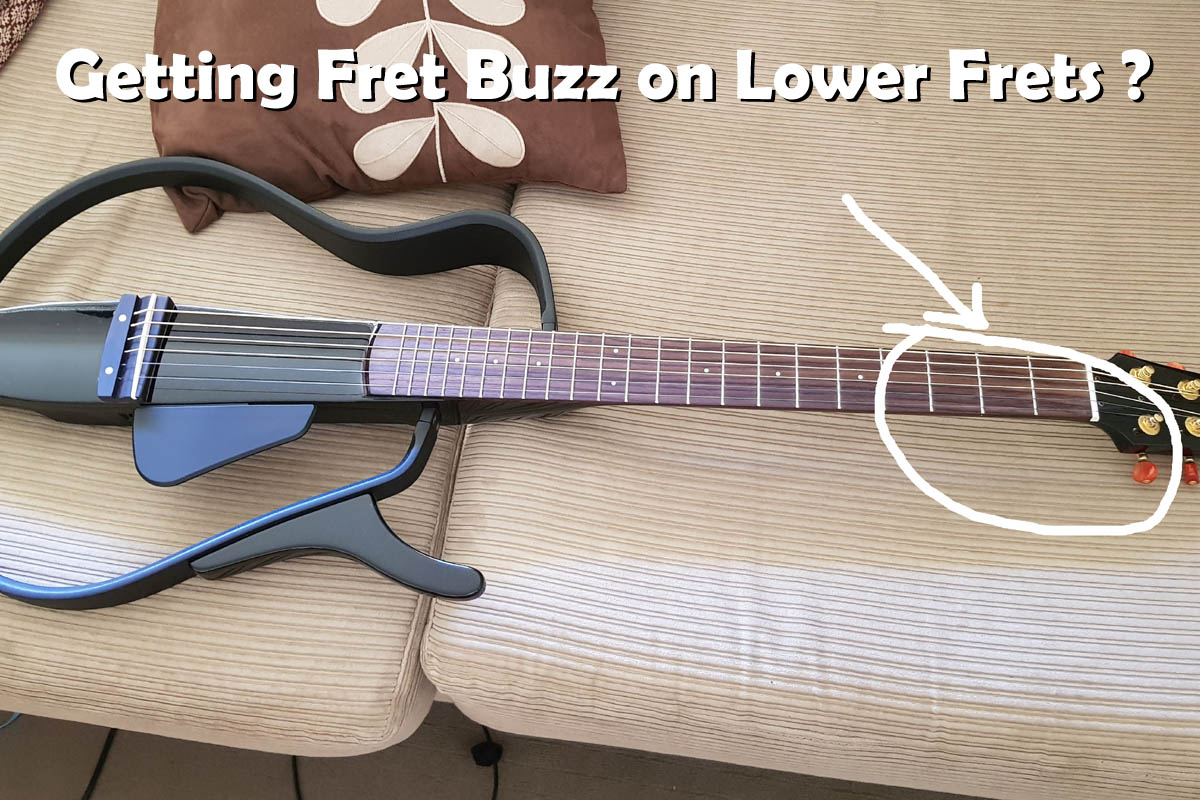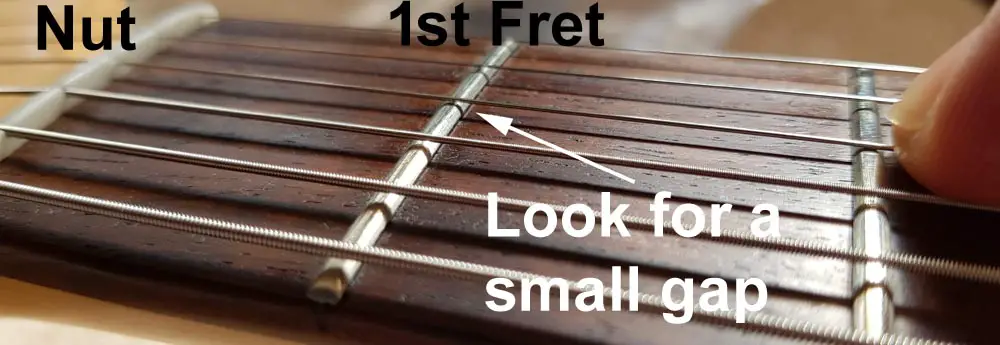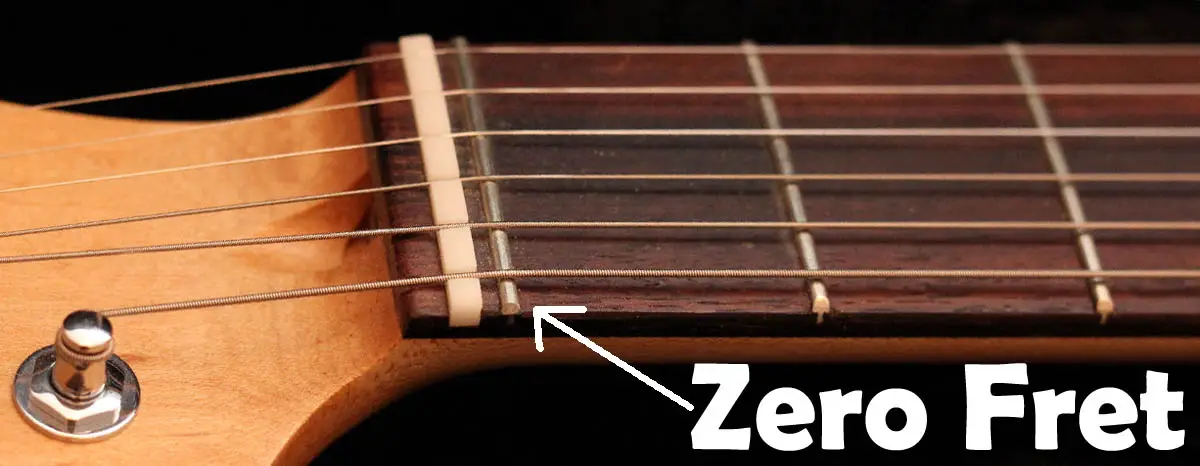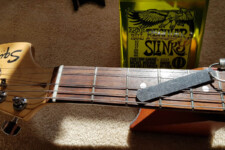Fret Buzz on Lower Frets – Fix a Common Guitar Issue – Tech Guide
There are a few different reasons that fret buzz can happen on the lower frets of an electric or acoustic guitar, and it can be a frustrating problem for any guitarist.
One reason is that the string may be seated too low in the nut, which can cause it to buzz against the fret. Fret buzz can also be caused by a poorly-made neck or worn frets, and in some cases fret buzz may be due to other factors such as climate changes.
Getting to the bottom of the problem is a must if the buzzing is excessive and causing you to lose concentration when playing. In some cases, it’s a problem worth fixing sooner rather than later to avoid more extensive work on your guitar.

What Causes Fret Buzz on the First Fret?
Fret buzz on the first fret is always due to the setup of the nut.
This problem could exist from the day you first got the guitar, but it’s more likely that the fret buzz has developed slowly over time as the slots have worn down in the nut.
If you have just changed to a new set of strings the buzzing can sound more prominent, whereas you didn’t notice it much with the old strings.
Especially if you have changed to a lighter gauge set of strings you are more likely to have this problem, since the nut slots are made to fit the old thicker strings, and the new ones may sit slightly lower to the frets.
This can cause the string to vibrate against the fret when played open, and you should find that when you hold the string at the first fret the buzzing stops.
Fixing Fret Buzz on the First Fret
For a guitar where most (or all) of the strings are buzzing on the first fret you will either need to raise the nut slightly, or replace the nut. Raising the nut comes with problems like the nut not seating properly on the neck, and also possibly dulling your sound and killing sustain.
If you don’t have experience with replacing a nut, it’s best to get a guitar tech to do it for you, and you can even replace the nut with a better material.
- For a guitar with only one or two buzzing strings you could fix these problems by filling the nut slot (super glue and baking powder work well!) and re-filing the slot. Once again, filing a nut slot correctly takes practice and if you’re not sure what you are doing you could end up with a worse sound than you started with.
What Causes Fret Buzz on Other Low Frets?
The lower frets tend to get used more heavily than the higher frets since everyone loves open chords, and beginners will play everything in the first few frets as they learn.
For this reason the crowns (rounded part on top of the frets) will slowly wear down flat. As this happens, the top of the frets become uneven compared to each other, and holding the string at a low spot on a fret may cause the string to rattle against the next fret up the neck.
So basically you end up with random high and low spots that will cause fret buzz on those lower frets.

Fixing Fret Buzz on Lower Frets
If your string buzzing problem is due to worn frets, you have two choices to fix the problem.
- Use a fret rocker to find the high points on frets, and file the high points down. You will then need to re-crown and polish the fret.
- Employ a guitar tech to level and re-dress all your frets. If you have a guitar that you really love, or a more expensive guitar this is a good option to restore your guitar to its best playing condition. For cheap guitars this may not be worth the expense.
Can Fret Buzz Cause Damage to Your Guitar?
If you have a more expensive guitar, the buzz has become a real problem, and it’s due to worn frets – it’s good to fix the problem before it becomes worse.
Letting the flat spots wear down further ends up causing deep notches in the frets. Deeper notches require more material to be filed off all the frets to level them again.
There is a limit to how far you can file the frets down before needing the guitar fully re-fretted, and this is a more expensive process.
So while fret buzz won’t damage your guitar itself, it can be a sign that the frets could need some attention soon.
Is Slight Fret Buzz Acceptable?
Yes! Especially on electric guitars with very low action you can expect to get a little fret buzz, but you probably won’t hear it through the amp unless it’s a more serious buzz.
Even with acoustic guitars with a low action, or when you strum heavily you can get a little string buzz, and it’s up to you to decide if it’s a problem for you.
If it’s just because you changed your strings, then give it a week of playing and you might find the buzz becomes less noticeable.
At the end of the day it’s your guitar and your ears, so if the buzz is not distracting you from playing then it’s ok.
How Do You Get Rid of Fret Buzz on Low E String?
The low E string vibrates more than the other strings, and is more likely to buzz on uneven frets when picked or strummed more heavily.
Fixing fret buzz on this string is the same process as for other strings, and you could even find the action is set too low at the bridge, causing buzz lower down the fretboard.
On an electric guitar you can easily raise the saddle as a test to see if the buzz goes away, but on an acoustic guitar you need to raise the entire saddle, and you are best talking to a guitar tech about this.
Can Zero Frets Cause String Buzz on Lower Frets?
Zero frets are not so common on guitars, however they are still used on some good guitars and bases.

A zero fret is designed to hold the strings at the right height before the first fret, which means the nut is only there to hold the strings at the correct spacing. It also ensures better intonation compared to nut slots that can wear over time.
Like all other frets, a zero fret can wear down and eventually allow the strings to buzz against the first fret.
This tends to happen more with guitarists who do a lot of string bending, as the sideways motion of the strings wears the zero fret crown.
When this happens the only course of action is to have a luthier replace the zero fret, setting the new one to the correct height.



